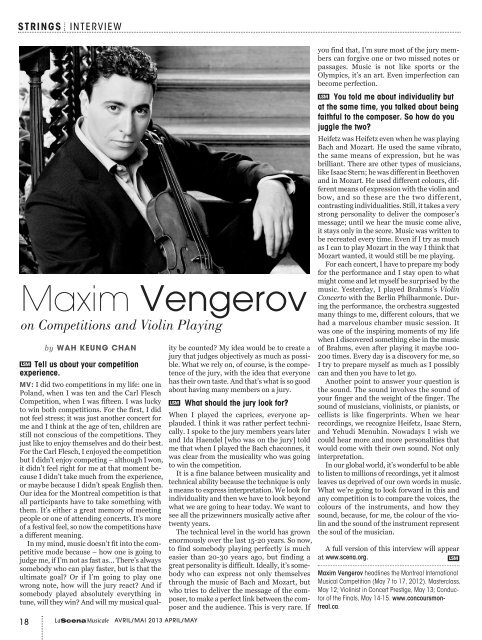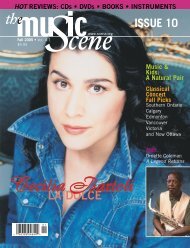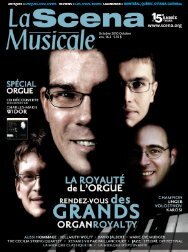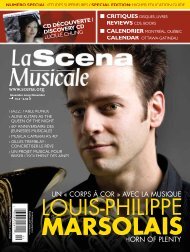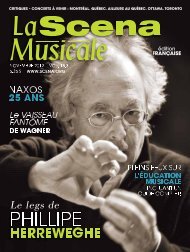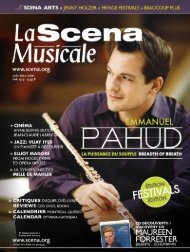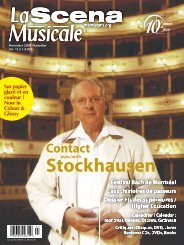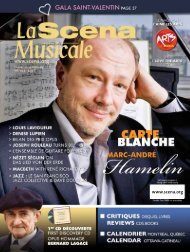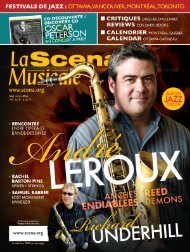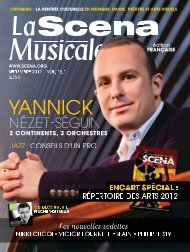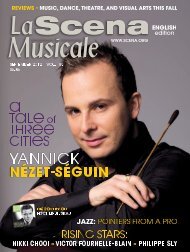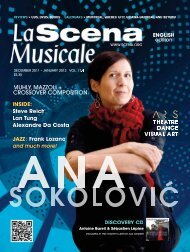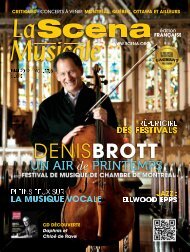Adobe Acrobat PDF complet (14 MB) - La Scena Musicale
Adobe Acrobat PDF complet (14 MB) - La Scena Musicale
Adobe Acrobat PDF complet (14 MB) - La Scena Musicale
Create successful ePaper yourself
Turn your PDF publications into a flip-book with our unique Google optimized e-Paper software.
STRINGS INTERVIEW<br />
Maxim Vengerov<br />
on Competitions and Violin Playing<br />
by WAH KEUNG CHAN<br />
18<br />
LSM Tell us about your competition<br />
experience.<br />
MV: I did two competitions in my life: one in<br />
Poland, when I was ten and the Carl Flesch<br />
Competition, when I was fifteen. I was lucky<br />
to win both competitions. For the first, I did<br />
not feel stress; it was just another concert for<br />
me and I think at the age of ten, children are<br />
still not conscious of the competitions. They<br />
just like to enjoy themselves and do their best.<br />
For the Carl Flesch, I enjoyed the competition<br />
but I didn’t enjoy competing – although I won,<br />
it didn’t feel right for me at that moment because<br />
I didn’t take much from the experience,<br />
or maybe because I didn’t speak English then.<br />
Our idea for the Montreal competition is that<br />
all participants have to take something with<br />
them. It’s either a great memory of meeting<br />
people or one of attending concerts. It’s more<br />
of a festival feel, so now the competitions have<br />
a different meaning.<br />
In my mind, music doesn’t fit into the competitive<br />
mode because – how one is going to<br />
judge me, if I’m not as fast as... There’s always<br />
somebody who can play faster, but is that the<br />
ultimate goal? Or if I’m going to play one<br />
wrong note, how will the jury react? And if<br />
somebody played absolutely everything in<br />
tune, will they win? And will my musical quality<br />
be counted? My idea would be to create a<br />
jury that judges objectively as much as possible.<br />
What we rely on, of course, is the competence<br />
of the jury, with the idea that everyone<br />
has their own taste. And that’s what is so good<br />
about having many members on a jury.<br />
LSM<br />
AVRIL/MAI 2013 APRIL/MAY<br />
What should the jury look for?<br />
When I played the caprices, everyone applauded.<br />
I think it was rather perfect technically.<br />
I spoke to the jury members years later<br />
and Ida Haendel [who was on the jury] told<br />
me that when I played the Bach chaconnes, it<br />
was clear from the musicality who was going<br />
to win the competition.<br />
It is a fine balance between musicality and<br />
technical ability because the technique is only<br />
a means to express interpretation. We look for<br />
individuality and then we have to look beyond<br />
what we are going to hear today. We want to<br />
see all the prizewinners musically active after<br />
twenty years.<br />
The technical level in the world has grown<br />
enormously over the last 15-20 years. So now,<br />
to find somebody playing perfectly is much<br />
easier than 20-30 years ago, but finding a<br />
great personality is difficult. Ideally, it’s somebody<br />
who can express not only themselves<br />
through the music of Bach and Mozart, but<br />
who tries to deliver the message of the composer,<br />
to make a perfect link between the composer<br />
and the audience. This is very rare. If<br />
you find that, I’m sure most of the jury members<br />
can forgive one or two missed notes or<br />
passages. Music is not like sports or the<br />
Olympics, it’s an art. Even imperfection can<br />
become perfection.<br />
LSM You told me about individuality but<br />
at the same time, you talked about being<br />
faithful to the composer. So how do you<br />
juggle the two?<br />
Heifetz was Heifetz even when he was playing<br />
Bach and Mozart. He used the same vibrato,<br />
the same means of expression, but he was<br />
brilliant. There are other types of musicians,<br />
like Isaac Stern; he was different in Beethoven<br />
and in Mozart. He used different colours, different<br />
means of expression with the violin and<br />
bow, and so these are the two different,<br />
contrasting individualities. Still, it takes a very<br />
strong personality to deliver the composer’s<br />
message; until we hear the music come alive,<br />
it stays only in the score. Music was written to<br />
be recreated every time. Even if I try as much<br />
as I can to play Mozart in the way I think that<br />
Mozart wanted, it would still be me playing.<br />
For each concert, I have to prepare my body<br />
for the performance and I stay open to what<br />
might come and let myself be surprised by the<br />
music. Yesterday, I played Brahms’s Violin<br />
Concerto with the Berlin Philharmonic. During<br />
the performance, the orchestra suggested<br />
many things to me, different colours, that we<br />
had a marvelous chamber music session. It<br />
was one of the inspiring moments of my life<br />
when I discovered something else in the music<br />
of Brahms, even after playing it maybe 100-<br />
200 times. Every day is a discovery for me, so<br />
I try to prepare myself as much as I possibly<br />
can and then you have to let go.<br />
Another point to answer your question is<br />
the sound. The sound involves the sound of<br />
your finger and the weight of the finger. The<br />
sound of musicians, violinists, or pianists, or<br />
cellists is like fingerprints. When we hear<br />
recordings, we recognize Heifetz, Isaac Stern,<br />
and Yehudi Menuhin. Nowadays I wish we<br />
could hear more and more personalities that<br />
would come with their own sound. Not only<br />
interpretation.<br />
In our global world, it’s wonderful to be able<br />
to listen to millions of recordings, yet it almost<br />
leaves us deprived of our own words in music.<br />
What we’re going to look forward in this and<br />
any competition is to compare the voices, the<br />
colours of the instruments, and how they<br />
sound, because, for me, the colour of the violin<br />
and the sound of the instrument represent<br />
the soul of the musician.<br />
A full version of this interview will appear<br />
at www.scena.org.<br />
LSM<br />
Maxim Vengerov headlines the Montreal International<br />
Musical Competition (May 7 to 17, 2012). Masterclass,<br />
May 12; Violinist in Concert Prestige, May 13; Conductor<br />
of the Finals, May <strong>14</strong>-15. www.concoursmontreal.ca.


